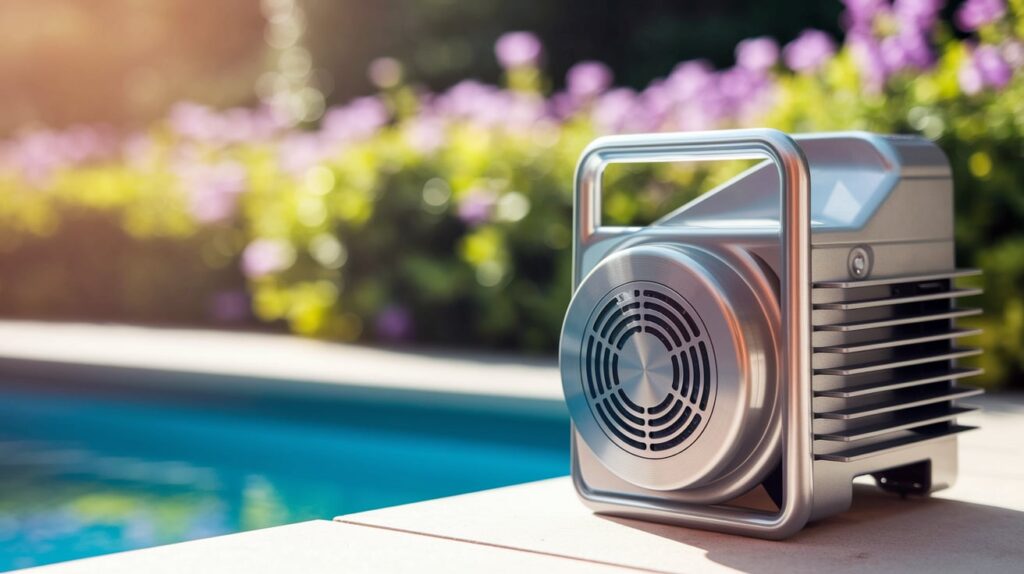A pool pump is essential for keeping water clean and safe. Over time, it may show signs of wear and tear.
Recommended Best Pool Pump 2025
| Recommendation | Product |
| Best Overall | Pentair EC-342001 Pool Pump |
| Popular Choice | Hayward W3SP1580X15 Power Flo Pool Pump |
| Best Value | Intex Above Ground Pool Sand Filter Pump |
| Best Budget | Aquastrong Sump Pump |
| Another Excellent Pick | XtremepowerUS 13″ Sand Filter Pool Pump |
Understanding these signs is crucial for maintaining your pool’s health. Ignoring issues can lead to bigger problems and costly repairs. By knowing what to look for, you can act quickly and avoid major inconveniences. This blog will help you identify key signs that your pool pump needs repair or replacement.
Whether it’s strange noises, reduced water flow, or leaks, recognizing these symptoms early can save you time and money. Dive into this guide to keep your pool pump running smoothly and ensure your swimming pool stays in top condition.
Unusual Noises
Your pool pump is the heart of your pool’s circulation system. When it starts making unusual noises, it’s a clear sign that something might be wrong. Identifying and addressing these sounds early can save you from costly repairs or replacements down the line.
Grinding Sounds
Grinding sounds from your pool pump are alarming. They often indicate that the motor bearings are worn out. This noise is not only annoying but also a sign that your pump is struggling to function properly.
Ignoring this could lead to motor burnout. If you hear grinding, it’s best to act quickly. Call a professional to assess whether you need a repair or a complete replacement of the bearings.
Loud Humming
A loud humming noise coming from your pool pump can be equally concerning. This sound usually points to an electrical issue or a failing capacitor. You might notice that the pump is running, but not moving water efficiently.
Another reason for humming could be debris clogging the pump impeller. If you’re handy, you might try to clear the blockage yourself. However, if the noise persists, consult a professional to diagnose the problem accurately.
Unusual noises are your pool pump’s way of communicating distress. Don’t ignore these signs. Addressing them promptly ensures your pool stays clean and safe for everyone to enjoy. Have you ever noticed strange sounds from your pool pump? What did you do about it? Share your experiences in the comments below!
Water Flow Issues
Water flow issues in your pool can be a sign of a problem with your pool pump. The pool pump is essential for circulating water and maintaining water quality. If the water flow is not as it should be, it might need attention.
Weak Circulation
Weak water circulation is a common sign of a pool pump issue. You might notice the pool water looks stagnant. Debris may not move towards the skimmer. This can lead to dirty pool water. A weak pool pump may struggle to keep the water clean. It may also cause uneven distribution of chemicals. This can affect water quality and safety.
No Water Movement
Another serious sign is no water movement at all. If the water is completely still, the pump might be broken. This can cause major problems. Without circulation, the water can become dirty and unsafe. Check the pump to see if it’s running. Listen for any unusual noises. If the pump is silent, it might need a repair or replacement.
Frequent Tripping
Frequent tripping of your pool pump can be a sign of trouble. If your pool pump frequently trips, it can disrupt your pool maintenance routine. It is important to address this issue promptly to avoid more serious problems down the line.
Breaker Trips Often
If the breaker trips often, it signals an electrical issue. This could be due to a faulty pump or wiring problems. Overheating can also cause the breaker to trip. Regular maintenance can help identify and resolve these issues early.
Pump Stops Unexpectedly
If your pump stops unexpectedly, it indicates a malfunction. This could be due to debris blocking the pump or motor issues. Checking and cleaning the pump can prevent unexpected stops. If the problem persists, it may need professional repair or replacement.

Air Leaks
When it comes to maintaining your pool, ensuring your pump is in top shape is crucial. Air leaks in the pump system can be a sign that something is wrong. These leaks can affect the pump’s efficiency and your pool’s cleanliness. Let’s dive into some common signs indicating air leaks in your pool pump.
Bubbles In Pool
One of the most obvious signs of an air leak is bubbles in the pool. If you notice bubbles coming from the pool’s return jets, it could mean air is entering the pump system. This typically happens when there’s a crack or loose connection somewhere in the pump or its fittings.
Check the pump lid and O-ring for any visible damage. Even a small crack can let air in. Tighten any loose fittings to ensure a proper seal. Regularly monitoring for these bubbles can help you catch air leaks early before they cause more significant issues.
Pump Loses Prime
Another common sign of air leaks is when the pump loses its prime. If you find that the pump is struggling to stay primed or loses prime frequently, air could be getting into the system. This disrupts the pump’s ability to maintain proper water flow.
Inspect the suction side of the pump, including the skimmer and pump basket, for any debris or clogs. These can cause the pump to suck in air instead of water. Ensuring these areas are clean can help maintain proper priming.
Have you ever noticed these signs in your pool pump? Regularly checking for air leaks can save you from costly repairs. Keep an eye on bubbles and the pump’s priming to ensure your pool stays clean and clear. What other maintenance tips do you follow to keep your pool in top condition?
Visible Leaks
Visible leaks are one of the most obvious signs that your pool pump needs repair or replacement. Leaks can cause severe damage if not addressed promptly. They can lead to increased water bills, equipment failure, and even larger structural issues. Below are some specific signs to watch for:
Water Around Pump
If you notice water pooling around your pump, it’s a clear sign that something is wrong. This could be due to a cracked seal or a loose connection. Even a small leak can lead to bigger problems over time.
It’s essential to address this issue quickly. Letting it go can result in more extensive damage and costlier repairs. Have you ever walked out to your pool area and noticed a puddle that shouldn’t be there? That’s a red flag.
Wet Spots On Equipment
Wet spots on your pump or other equipment are another indicator of a leak. Look for moisture around joints, seals, and connections. Even if it looks minor, it should not be ignored.
These wet spots can lead to corrosion and further damage. Over time, this can affect the overall efficiency of your pool system. Have you checked your equipment lately?
Visible leaks are not just an inconvenience; they are a warning sign. Keeping an eye out for water around the pump and wet spots on equipment can save you from costly repairs down the line. Always address these issues as soon as you notice them to keep your pool running smoothly.
Overheating
Overheating is a common issue with pool pumps. It can lead to severe damage. Recognizing signs of overheating early can prevent costly repairs. The two main signs of overheating are a hot pump and a burnt smell.
Hot To Touch
If your pool pump feels hot to touch, it’s overheating. A pump should not be too hot. Excess heat indicates a problem. This could be due to faulty wiring. It might be a sign of internal issues. Check if the pump is too hot. If it is, turn it off immediately.
Burnt Smell
A burnt smell is another sign of overheating. This smell is distinct and unpleasant. It means parts inside the pump are burning. Electrical issues might be causing this. Overheating can damage the pump’s motor. If you notice a burnt smell, take action quickly.
Increased Energy Bills
Have you noticed your energy bills skyrocketing lately? If you own a pool, your pool pump might be the culprit. An inefficient pool pump can lead to unexpectedly high electricity costs. Understanding the signs can save you money and headaches.
Higher Costs
If your energy bill has been consistently higher than usual, it’s time to investigate your pool pump. A malfunctioning pump works harder to circulate water, consuming more electricity. This can lead to a significant increase in energy costs.
Don’t ignore these signs. Addressing the issue promptly can save you hundreds of dollars annually.
Longer Run Times
Longer run times mean more energy consumption. This is directly linked to higher energy bills. It’s not just about the money; your pump is working harder and wearing out faster.
Are you ready to check your pool pump for these signs? Your wallet will thank you!
Old Age
A noisy pool pump or decreased water flow might indicate it needs repair or replacement. Higher electricity bills can also signal issues. Regular maintenance can prevent these problems.
### Old Age
Just like any other piece of equipment, your pool pump has a lifespan. The older it gets, the more likely it is to experience issues. Understanding the signs of old age in your pool pump can save you time, money, and headaches.
###
Pump Age Over 10 Years
If your pool pump is over 10 years old, it’s probably time to start thinking about a replacement. Technology has advanced, and newer pumps are more energy-efficient.
Older pumps tend to consume more electricity. This can result in higher utility bills. Newer models can save you money in the long run.
###
Frequent Repairs Needed
Do you find yourself calling the repair guy more often? If your pump constantly needs fixing, it’s a strong sign it might be better to replace it.
Frequent repairs not only cost money but also time. Your swimming schedule gets disrupted, and who wants that?
Think about the cumulative cost of all those repairs. Sometimes, buying a new pump is more cost-effective than constant fixes.
Is your pool pump showing signs of old age? You might want to consider if it’s worth the hassle to keep fixing it.
Frequently Asked Questions
How Do I Know If My Pool Pump Needs To Be Replaced?
Your pool pump may need replacement if it makes unusual noises, leaks, loses pressure, or frequently shuts off.
How Do You Know Your Pool Pump Is Going Out?
You know your pool pump is going out if you notice unusual noises, leaks, poor water circulation, or frequent tripping of the circuit breaker.
How Often Should I Replace A Pool Pump?
Replace a pool pump every 8-12 years. Regular maintenance can extend its lifespan. Watch for decreased performance or unusual noise.
Is It Worth Repairing A Pool Pump?
Yes, repairing a pool pump is often worth it. Repairs can extend the pump’s lifespan and improve efficiency. Consider the pump’s age and repair costs. If repairs are less than half the cost of a new pump, it’s usually a good investment.
Conclusion
Regular pool pump checks can prevent bigger issues. Look for strange noises. Weak water flow is a red flag. Frequent leaks signal problems. Higher energy bills may indicate inefficiency. Quick action saves money. Regular maintenance extends pump life. Don’t ignore signs of trouble.
A well-functioning pump keeps your pool clean. Repair or replace as needed. Enjoy a hassle-free swimming season.








